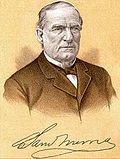October 12, 1869 | |||||||||||||||||
| |||||||||||||||||
 County results Merrill: 50–60% 60–70% 70–80% 80–90% 90–100% Gillespie: 50–60% 60–70% No Data/Votes: | |||||||||||||||||
| |||||||||||||||||
| Elections in Iowa |
|---|
 |
The 1869 Iowa gubernatorial election was held on October 12, 1869. Incumbent Republican Samuel Merrill defeated Democratic nominee George Gillespie with 62.93% of the vote.

